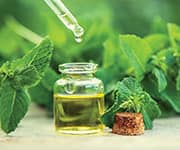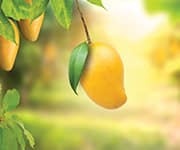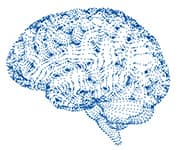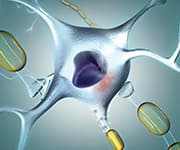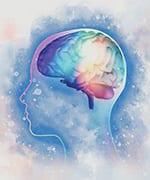Life Extension Magazine®
Losing your train of thought or finding it hard to pay attention is common as we get older.
If it starts to interfere with daily life, you may be experiencing what is known as brain fog.1
Brain fog refers to a general feeling of decreased mental energy and focus. It may be characterized by mental fatigue and clouding, forgetfulness, fuzzy thinking, confusion, and difficulty concentrating.
Scientists have identified two plant-based nutrients that can prevent or potentially reverse these alterations to bring back mental clarity, energy, and focus.
In clinical studies, mango leaf extract:2,3
- Improves reaction time,
- Reduces mental fatigue, and
- Boosts attention, performance accuracy,and working memory.
In other clinical studies, peppermint oil reduced the development of mental fatigue and improved aspects of memory and attention. 4
Mango leaf extract and peppermint oil can provide a cognitive boost that may help replace fog with focus.
What Causes Brain Fog?
The feeling of mental fatigue, foggy thinking, and difficulty concentrating is more than an annoyance. It can decrease cognitive performance and make it difficult to get work done.
In order to pinpoint underlying changes in the brain that may cause feelings of mental fogginess, scientists studied medical conditions that produce some of the same mental symptoms.
Their research showed that complaints consistent with brain fog have been reported by people with: 5-10
- Inflammatory disorders of various types,
- Allergies (including seasonal allergies),
- Immune disorders, which increase inflammation, and
- Dietary sensitivities.
These observations led researchers to propose that brain fog may result from:5-7
- Inflammation,
- Histamine (the chemical that causes allergic symptoms),
- Neurotransmitter imbalance, and
- Impairments in neuronal activity.
Plant Extracts
Using this research, scientists identified two plant-derived nutrients that appear to have the potential to prevent or even reverse these underlying biological changes.
These two nutrients also had a track record of improving symptoms of brain fog:
- Mango leaf extract has been clinically shown to improve reaction time, reduce mental fatigue, and boost attention, performance accuracy, and working memory.2,3
- Peppermint oil has been clinically shown to significantly reduce the development of mental fatigue and improve aspects of attention and memory.4
How Mango Leaf Protects the Brain
Long used in Asia and Africa to treat fatigue, mango leaf has more recently been shown to exert properties that are neuroprotective, anti-inflammatory, and anti-diabetic.2
These effects, which scientists suggested may help prevent brain fog, are believed to be largely attributable to the polyphenol compound mangiferin.
Mangiferin’s capacity to protect the brain has been demonstrated in animal studies in which it:2,11,12
- Decreased neuroinflammation,
- Reduced oxidative stress, and
- Provided neurotransmitter support.
Other animal models found that mangiferin use prevented cognitive and memory impairment, key symptoms of brain fog.13
Mangiferin was also shown in rodent studies to exhibit anti-allergic properties,14,15 suggesting potential benefits against brain fog associated with allergies.
Mango Leaf in Human Studies
Scientists conducted controlled human trials to evaluate whether mango leaf extract could treat symptoms consistent with brain fog.
They divided healthy adults into four groups. One group took a mango leaf extract containing 60% mangiferin, the second group took caffeine, the third group took the extract plus caffeine, and the fourth took a placebo.
Compared to baseline, the mango leaf extract resulted in: 2
- A remarkable 47% reduction in fatigue, and
- An almost 5% improvement in reaction time.
These improvements were significantly greater than those seen with caffeine alone or with a combination of caffeine and mango extract.
Tests of electrical activity in the brain showed that those taking mango leaf extract had increased activity in regions associated with complex cognitive processing, attention, and memory.2
In another clinical study, researchers gave healthy young adults either 300 mg of the mango leaf extract or a placebo.
The extract improved areas of cognitive function, including aspects of:3
- Attention,
- Performance accuracy, and
- Working memory.
This evidence supports the use of mango leaf extract to enhance brain activity, reduce mental fatigue, and support mental focus and performance.
What you need to know
Boost Brain Power and Undo Brain Fog
- Brain fog is a feeling of reduced mental energy, clarity, and focus.
- Mango leaf extract and peppermint oil were each shown in preclinical studies to address the likely underlying causes of brain fog.
- In clinical trials, mango leaf extract and peppermint oil each reduced mental fatigue while improving attention and working memory.
- Combined, these ingredients may maximize brain support and help erase symptoms of brain fog.
Peppermint’s Brain Benefits
Peppermint is an herb traditionally used for medicinal properties, including aiding digestion and promoting calm.
Plants rich in monoterpenes have been shown in placebo-controlled studies to have cognitive benefits.16,17 Peppermint oil contains many of these compounds, including menthol and menthone.18
Some human studies have shown that peppermint teas:19
- Improved memory, and
- Boosted mental alertness.
In addition, mint species have demonstrated the ability to modulate various neurotransmitters in the brain, such as acetylcholine and GABA. These neurotransmitters play pivotal roles in mental alertness, cognition, and mood.4
Clinical Trial of Peppermint Oil
In a controlled clinical trial, scientists gave healthy adults either peppermint oil containing 60% monoterpenes or a placebo. Tests on aspects of memory, attention, and mood were administered.
The peppermint oil group significantly:4
- Reduced the development of mental fatigue,
- Improved aspects of attention and working memory.
The volunteers who received the placebo were severely fatigued within a few hours after the cognitive tests.4
Human studies overall demonstrate that peppermint oil and mango leaf extract can help restore mental clarity, focus, and energy.
A combination of these two ingredients may maximize their ability to clear away brain fog.
Summary
Scientists have identified two plant-based ingredients that can improve various aspects of brain fog.
Mango leaf extract and peppermint oil have each been shown to reduce mental fatigue, and improve attention, memory, and cognitive performance.
If you have any questions on the scientific content of this article, please call a Life Extension Wellness Specialist at 1-866-864-3027.
References
- Available at: https://health.clevelandclinic.org/brain-fog/. Accessed October 10, 2022.
- Lopez-Rios L, Wiebe JC, Vega-Morales T, et al. Central nervous system activities of extract Mangifera indica L. J Ethnopharmacol. 2020 Oct 5;260:112996.
- Wightman EL, Jackson PA, Forster J, et al. Acute Effects of a Polyphenol-Rich Leaf Extract of Mangifera indica L. (Zynamite) on Cognitive Function in Healthy Adults: A Double-Blind, Placebo-Controlled Crossover Study. Nutrients. 2020 Jul 23;12(8).
- Kennedy D, Okello E, Chazot P, et al. Volatile Terpenes and Brain Function: Investigation of the Cognitive and Mood Effects of Mentha x Piperita L. Essential Oil with In Vitro Properties Relevant to Central Nervous System Function. Nutrients. 2018 Aug 7;10(8).
- Hartgerink-Lutgens I, Vermeeren A, Vuurman E, et al. Disturbed cognitive functions after nasal provocation in patients with seasonal allergic rhinitis. Clin Exp Allergy. 2009 Apr;39(4):500-8.
- Theoharides TC, Stewart JM, Hatziagelaki E, et al. Brain “fog,” inflammation and obesity: key aspects of neuropsychiatric disorders improved by luteolin. Front Neurosci. 2015;9:225.
- Balter LJ, Bosch JA, Aldred S, et al. Selective effects of acute low-grade inflammation on human visual attention. Neuroimage. 2019 Nov 15;202:116098.
- Croall ID, Hoggard N, Aziz I, et al. Brain fog and non-coeliac gluten sensitivity: Proof of concept brain MRI pilot study. PLoS One. 2020;15(8):e0238283.
- Makhlouf S, Messelmani M, Zaouali J, et al. Cognitive impairment in celiac disease and non-celiac gluten sensitivity: review of literature on the main cognitive impairments, the imaging and the effect of gluten free diet. Acta Neurol Belg. 2018 Mar;118(1):21-7.
- Yelland GW. Gluten-induced cognitive impairment (“brain fog”) in coeliac disease. J Gastroenterol Hepatol. 2017 Mar;32 Suppl 1:90-3.
- Lei LY, Wang RC, Pan YL, et al. Mangiferin inhibited neuroinflammation through regulating microglial polarization and suppressing NF-kappaB, NLRP3 pathway. Chin J Nat Med. 2021 Feb;19(2):112-9.
- Marquez L, Garcia-Bueno B, Madrigal JL, et al. Mangiferin decreases inflammation and oxidative damage in rat brain after stress. Eur J Nutr. 2012 Sep;51(6):729-39.
- Lum PT, Sekar M, Gan SH, et al. Protective effect of mangiferin on memory impairment: A systematic review. Saudi J Biol Sci. 2021 Jan;28(1):917-27.
- Sekar M. Molecules of Interest – Mangiferin – A Review. Annual Research & Review in Biology. 2015 01/10;5(4):307-20.
- Garcia D, Escalante M, Delgado R, et al. Anthelminthic and antiallergic activities of Mangifera indica L. stem bark components Vimang and mangiferin. Phytother Res. 2003 Dec;17(10):1203-8.
- Falcone PH, Nieman KM, Tribby AC, et al. The attention-enhancing effects of spearmint extract supplementation in healthy men and women: a randomized, double-blind, placebo-controlled, parallel trial. Nutr Res. 2019 Apr;64:24-38.
- Falcone PH, Tribby AC, Vogel RM, et al. Efficacy of a nootropic spearmint extract on reactive agility: a randomized, double-blind, placebo-controlled, parallel trial. J Int Soc Sports Nutr. 2018 Dec 12;15(1):58.
- Zhao H, Ren S, Yang H, et al. Peppermint essential oil: its phytochemistry, biological activity, pharmacological effect and application. Biomed Pharmacother. 2022 Oct;154:113559.
- Moss M, Jones R, Moss L, et al. Acute consumption of Peppermint and Chamomile teas produce contrasting effects on cognition and mood in healthy young adults. Plant Science today. 2016;3:327-36.


